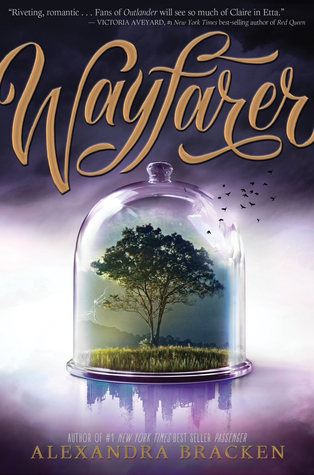 After reading Alexandra Bracken’s Passenger/Wayfarer series, I do believe that duologies may be my favorite. The first book draws you in and leaves you wanting more of the world and the story and then the second book delivers without making things feel too drawn out. Wayfarer is a highly enjoyable sequel that not only delivers on the promise of this family conflict across thousands of years and every continent but also takes the story in an unexpected direction and adds in new elements to keep the world feeling fresh.
After reading Alexandra Bracken’s Passenger/Wayfarer series, I do believe that duologies may be my favorite. The first book draws you in and leaves you wanting more of the world and the story and then the second book delivers without making things feel too drawn out. Wayfarer is a highly enjoyable sequel that not only delivers on the promise of this family conflict across thousands of years and every continent but also takes the story in an unexpected direction and adds in new elements to keep the world feeling fresh.
At the heart of the story are Etta and Nicholas. When last we left our heroes, they were separated thanks to a massive shift in the timeline. Etta’s a very likable heroine who has been thrust into a fairly awful situation by a mother who’s not exactly in the running for Parent of the Year while Nicholas is such a solidly good person despite life having dealt him a fairly crappy hand of cards. Bracken both fleshes out her existing cast and expands it in delightfully diverse ways. The two standouts in this book include new character Li Min and previous antagonist Sophia who not only looks pretty badass now but gets a rather excellent character arc. (Who isn’t a sucker for a well-executed ‘bad guy turned reluctant good guy ally’ plot line?) The more I think about Sophia, the more I like her which is impressive given how much I disliked her at the start of Passenger. That’s another great thing about Bracken’s writing: all of her female characters are distinct and don’t fill any sort of stereotypical role that feels obligatory or like they’re there just to check a box. (Of course, one would expect nothing less from an author who wrote such a great Princess Leia.)
The entire conceit of Wayfarer allows Bracken to dive into a plethora of locations, time periods, and alternate timelines that keep everything exciting and new especially since I suspect that the vast majority of the readers aren’t familiar with all of the times/locations. I usually try to avoid spoilers but early 20th century Russian history fans are in for a treat. It would be wonderful to see more authors take a note from this duology and branch a little further away from the Western norm. It’s also worth noting that the rules for time travel are kept consistent and logical; something not always easily done.
Most importantly though, Wayfarer’s ending is satisfying and poignant and not depressing; something that I suspect a lot of people in this world could use right now. That’s not to say that the series hasn’t had its share of sad and tragic moments but the books left me feeling happy and content. These are books that I would happily recommend to my younger cousins in middle and high school and also to my like-aged friends in their 20s and 30s. There’s a little something for everyone here in these books and I could happily read more stories about the warring families if Alex Bracken ever chooses to write them.
Like Passenger before it, Wayfarer gets a strong recommendation. If you’d like to immerse yourself in a fun fantastical world that’s rich in history and filled with excellent characters, both books are well-worth your time.
Thank you to Hyperion for providing an advanced copy of this book for review purposes.

